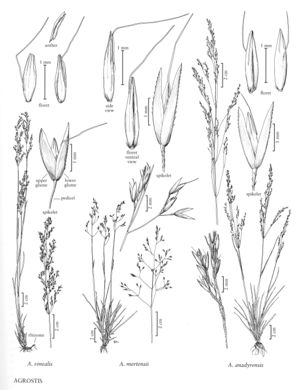Difference between revisions of "Agrostis vinealis"
FNA>Volume Importer |
FNA>Volume Importer |
Revision as of 21:22, 16 December 2019
Plants perennial; densely cespitose, rhizomatous, rhizomes to about 10 cm, slender, scaly, not stoloniferous. Culms 10-60 cm, erect or geniculate at the base, slender, smooth, with 1-2(4) nodes. Sheaths smooth; ligules 0.6-5 mm, dorsal surfaces scabridulous, apices acute to obtuse, entire or lacerate to erose; blades 2-10 cm long, 1-3 mm wide, usually flat, sometimes involute, sometimes bristlelike, adaxial surfaces scabrous, abaxial surfaces sometimes scabrous. Panicles 2-15 cm long, (0.8)1-5.5(8) cm wide, lanceolate to oblong, somewhat open, often contracted after anthesis, lowest node with (1)3-8 branches; branches scabrous, readily visible, more or less erect, branched mostly at or below midlength, spikelets closely clustered, lower branches 3-5 cm; pedicels 0.5-2 mm. Spikelets lanceolate to narrowly oblong, greenish, purplish, or brownish. Glumes equal to subequal, 2-4 mm, membranous, acute to acuminate; lower glumes 1-veined, scabrous to scabridulous over the midvein; upper glumes usually shorter than the lower glumes, 1(3)-veined, almost smooth; callus hairs to 0.1 mm, sparse; lemmas 1.5-2.4 mm, about 3/4 the length of the glumes, bases minutely pubescent, glabrous and smooth elsewhere, translucent to opaque, 5-veined, veins usually prominent distally, apices blunt, entire, usually awned from near the base, awns 2-4.5 mm, geniculate, rarely unawned; paleas to about 0.2 mm; anthers 3,1-1.8 mm. Caryopses 0.8-1.3 mm; endosperm solid. 2n = 28.
Distribution
Alaska, Greenland
Discussion
Agrostis vinealis is native to Eurasia; it is not clear if populations in Greenland and Alaska represent a circumboreal distribution, or are introductions. It forms a fine, compact turf. It is similar to A. canina (see previous) in its habitat, except that it appears to be more heat tolerant and drought resistant. It used to be included in A. canina, but differs from that species in its subterranean rhizomes and lack of leafy stolons. Agrostis vinealis readily hybridizes with A. capillaris (p. 639) and A. stolonifera (p. 641), the hybrids being somewhat intermediate between the two parents.
Selected References
None.
